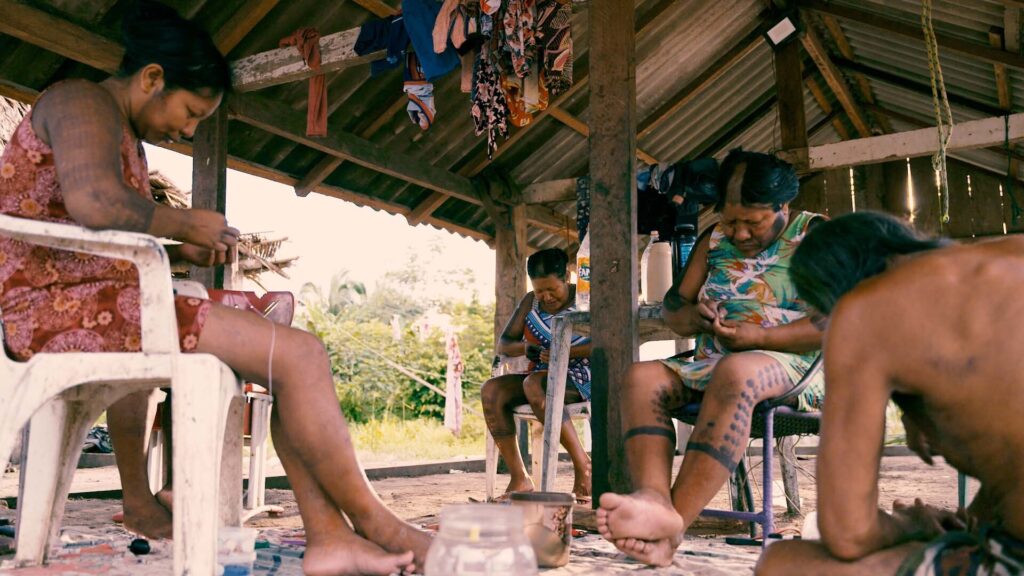FINNISH STEELMAKER Outokumpu has stopped purchasing nickel from the Onça Puma mine, operated by a Vale subsidiary in the Serra dos Carajás region, in southeastern Pará. The end of the partnership followed suspicions of contamination of the Cateté River by heavy metals. This river flows through the Xikrin do Rio Cateté Indigenous Land in Parauapebas, Pará.
The breaking of ties is highlighted in the report “Seeking for Justice – Monitoring report on the human rights impacts of Outokumpu’s value chain in Pará, Brazil”. The document was released on December 3 by the Finnish organization Finnwatch, with support from Repórter Brasil. Finnwatch monitors human rights violations in global supply chains.
In 2021, Repórter Brasil and Finnwatch published an investigation into the social and environmental impacts of the project on the Xikrin people. Among the most serious issues identified was the contamination of the Cateté River by heavy metals, which continues to this day, according to indigenous people and researchers.
“Outokumpu has made significant changes to its human rights responsibility work,” said Sonja Finér, executive director of Finnwatch. She noted that the Finnish state-owned company had implemented systematic processes for social and environmental responsibility. Finér also acknowledged that “Vale has also taken steps forward in this regard.”
Other European and Asian multinational companies in the metals and steel sectors have not followed Outokumpu’s example and continue to purchase nickel from the mine.
In response to the report, Vale denies being responsible for the contamination of the Cateté River, attributing it to the “natural mineralization” of the region and pesticide runoff. Vale Base Metals (VBM), Vale’s subsidiary responsible for the mine, also stated that it considers its relationship with the Xikrin people to be “healthy” and believes this sentiment is mutual.
Read the companies’ responses and the full report here.
Metal alloy fuels global market
Located in Ourilândia do Norte (PA), the Onça Puma mine produces nickel, used in the production of stainless steel and rechargeable batteries. The operation is controlled by VBM, Vale’s subsidiary focused on nickel and copper production. Among the mine’s buyers in 2023 were multinationals from Italy, Sweden, the UK, France, and China.

The Xikrin people blame Vale for the contamination of the Cateté River with heavy metals. The river was once used by the approximately 2,000 indigenous people for drinking water and fishing, but according to residents, this is no longer the case.
“The river is dead,” said an anonymous Xikrin person quoted in the report. “The river was where we drank, took water, and caught fish to eat. Now, because of the pollution, we have nothing, and we can’t do anything [in the river] anymore.”
The legal battle between the Xikrin and Vale has been ongoing since at least 2011. Initially, the indigenous people pointed to a lack of participation in the environmental licensing process for the mine. Court settlements led to compensation payments to local inhabitants and resulted in the closure of civil lawsuits. However, a legal action regarding Vale’s role in the contamination of the Cateté River remains open.
According to Finnwatch, Vale and VBM should adhere to the principles of the United Nations (UN) regarding business and human rights, and identify and develop policies to manage issues related to these topics.
Researchers dispute Vale’s claims
For the Mineral Treatment, Energy, and Environment Group (GTEMA) of the Federal University of Pará (UFPA), “there is no longer any doubt regarding the responsibility of the Onça Puma project in contributing to the contamination of the Cateté River.”
In a 2020 study, UFPA researchers found that “100% of individuals are contaminated with at least one heavy metal, at alarming levels. Notably, lead, mercury, manganese, aluminum, and iron are present in some individuals at frightening levels.”
Vale cites a 2017 report commissioned by the Brazilian court to argue that a direct causal link between the mine and the river pollution could not be established. The company also claims to have monitored the water quality of the Cateté River since 2005 and acknowledged that some measurements showed pollutant concentrations exceeding legal limits, attributing the findings to the region’s natural mineral characteristics.
Changes to indigenous traditions
With the river contaminated, local reports gathered by Repórter Brasil and Finnwatch indicate that indigenous people have been forced to abandon traditional fishing and hunting practices, becoming dependent on financial compensation from Vale to purchase processed foods. This shift has led to an increase in obesity and diabetes.
Finnwatch recommended that Vale implement a cleanup of the Cateté River with active participation from the Xikrin people and improve its consultation and transparency processes. The organization also emphasized the need for additional studies to confirm the cause of the river’s pollution.
Organization acknowledges Vale’s progress
The Finnish organization also recognized the progress made by Vale since 2021, when the social and environmental impacts were first revealed. “In 2021, Vale refused to comment on the conflict to Finnwatch. Now, it has initiated a long dialogue with us. We hope that the company’s increased transparency and its engagement with customers will help resolve the issues affecting the Xikrin’s future,” said Sonja Finér.
The report also calls for more effective actions from the Brazilian government in protecting indigenous rights and greater international involvement in denouncing abuses and preserving the Xikrin’s territory and way of life.
“The company’s customers must encourage Vale/VBM to take active steps to improve the environment and prevent future pollution, and demand transparent and understandable public reports on these measures,” urged Finnwatch.

